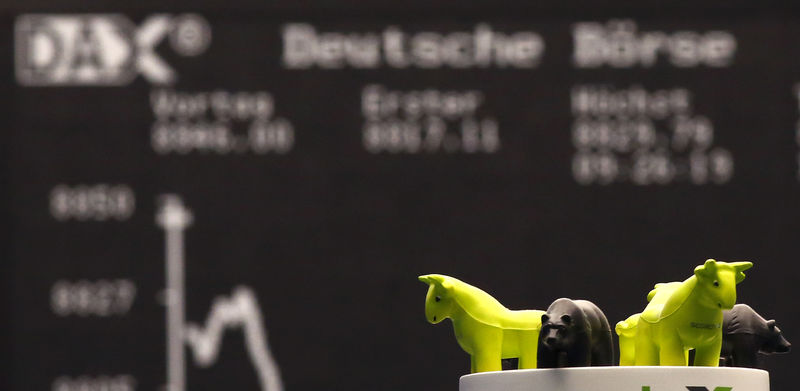
© Reuters.
By Peter Nurse
Investing.com – European stock markets are expected to open lower Monday as investors continue to fret about slowing global growth as central banks tighten monetary policy to combat soaring inflation.
At 2:05 AM ET (0605 GMT), the contract in Germany traded 0.6% lower, in France dropped 1%, and the contract in the U.K. fell 0.7%.
European stocks fell last week, with the , and all down around 2%, led lower by a slump on Wall Street after the lifted by 50 basis points and pointed to further increases of a similar size in the months ahead.
The also raised interest rates, for the fourth meeting in a row, while policymakers at the have started talking more openly about hiking rates, potentially starting in July.
The ECB should hike as many as three times this year to combat inflation, Austrian central bank governor , a known hawk, said in a newspaper interview over the weekend.
This week sees the release of Germany’s and preliminary first quarter data from the U.K., and these are likely to point to slowing growth in two of Europe’s largest economies.
Data earlier Monday from China showed the country’s slowed to single digits in April, growing 3.9% in April from a year earlier, compared with the 14.7% growth reported in March. The growth was the slowest since June 2020.
Elsewhere, Russia is preparing to mark the Monday anniversary of the Soviet Union’s victory over Nazi Germany in World War II amid fears that President Putin will authorize an escalation of the conflict in Ukraine.
In corporate news, earnings from BioNTech (ETR:) will be in the spotlight, with the drugmaker set to benefit from sales of the COVID vaccine it developed with U.S. giant Pfizer (NYSE:).
Oil prices were largely steady Monday with the focus on talks within the European Union over a Russian oil embargo, which is likely to further tighten global supplies.
European Union governments are set to meet again later this session to work out how to ensure countries most dependent on Russian energy, like landlocked Hungary, Slovakia, and the Czech Republic can cope with the proposed ban on Russian oil. The proposal requires a unanimous vote among EU members.
Over the weekend, the Group of Seven major industrialized nations agreed to a similar ban on imports of Russian oil.
However, there still remain concerns over global oil demand, especially with China’s ongoing COVID lockdowns. Saudi Arabia, the world’s top oil exporter, lowered crude prices for Asia and Europe for June on Sunday.
By 2:05 AM ET, futures traded 0.4% lower at $109.30 a barrel, while the contract fell 0.4% to $112.00. Both benchmarks rose around 4% last week for a second week in a row.
Additionally, fell 0.6% to $1,870.75/oz, while traded 0.4% lower at 1.0512.


Be the first to comment